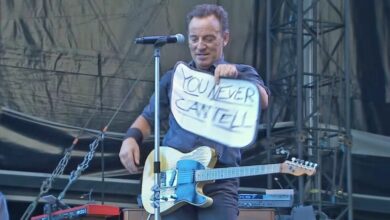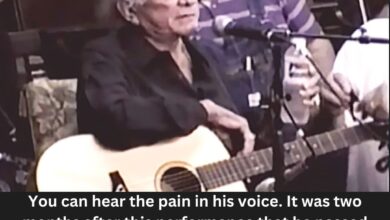His voice bore the sorrow; two months later, he was gone, remaining a lion, even in frailty.
Johnny Cash’s final live performance, held on July 5, 2003, at the Carter Family Fold in Hiltons, Virginia, remains a powerful tribute to his extraordinary legacy as one of the most revered figures in American music history. At this late stage in his life, Cash was contending with significant health issues, including severe vision impairment and physical frailty, which were compounded by the recent death of his beloved wife, June Carter Cash. Despite these challenges, his performance was marked by a resilience and dedication that deeply moved those in attendance.
The concert opened with Cash’s familiar, unassuming greeting, “Hello, I’m Johnny Cash,” setting a tone of intimate familiarity that characterized the evening. He was accompanied by a small ensemble featuring his son, John Carter Cash, on vocals, along with Jerry Hensley on guitar and Bobby Starnes on bass. The setlist was a poignant collection of Cash’s most beloved songs, including classics like “Folsom Prison Blues,” “I Walk the Line,” “Ring of Fire,” and “Big River.” Kris Kristofferson’s reflective “Sunday Mornin’ Comin’ Down” was also featured, showcasing Cash’s ability to interpret other artists’ work with his signature depth.
A particularly emotional moment came when Cash performed “Angel Band,” a song previously sung by Emmylou Harris at June Carter Cash’s funeral. This performance was a deeply personal tribute to his late wife, highlighting the profound grief Cash was enduring while honoring the significant role she had played in his life. Another notable moment was Cash’s rendition of “Understand Your Man,” a song he had not performed in over twenty years. Its inclusion added a layer of nostalgia to the evening, reflecting on his enduring journey as an artist and the passage of time.
Throughout the concert, Cash’s voice, though affected by age and illness, maintained a remarkable emotional resonance that captured the audience’s attention. He spoke candidly about the influence of June’s spirit on his life and work, creating a touching link between his personal experiences and his musical expression. This ability to merge personal emotion with performance was a defining feature of Cash’s career and was poignantly evident during this final show. His heartfelt stories and reflections provided a deeper understanding of his songs, making the performance not just a musical event but also a personal farewell.
Johnny Cash’s influence on American music extended far beyond his distinctive vocal style and rebellious spirit. His contributions bridged various genres, including country, rock, and folk, reflecting his diverse musical influences and his capacity to resonate with a wide audience. As one of the most iconic and enduring figures in the music industry, Cash’s final performance at the Carter Family Fold stands as a testament to his profound impact on the world of music and his unwavering dedication to his craft. His ability to address themes of sorrow, redemption, and resilience in his music left an indelible mark on listeners and fellow musicians alike.
Underpinning the evening was the support and presence of the Carter Family, Johnny’s in-laws and musical collaborators, who provided a sense of family and continuity. June Carter Cash’s influence was palpable throughout the performance, as the Carter Family Fold itself is a venue steeped in the legacy of country music and the Carter family’s contributions to it. The intimate setting allowed for a deeply personal connection between Cash and his audience, creating an atmosphere of warmth and reverence that mirrored the close-knit nature of his family life.
The instrumentation during the concert was minimal yet effective, allowing Cash’s voice and the emotional weight of his songs to take center stage. Jerry Hensley’s guitar work and Bobby Starnes’ bass provided a subtle but solid foundation, complementing Cash’s straightforward and unembellished singing style. This simplicity highlighted the raw honesty of Cash’s performances, a characteristic that endeared him to millions of fans around the world. The restrained arrangement ensured that every note and every word carried the full weight of Cash’s enduring legacy.
As the evening progressed, the setlist moved seamlessly from high-energy tracks to more contemplative songs, showcasing Cash’s versatility as a performer. His ability to convey a wide range of emotions, from defiance to vulnerability, was evident throughout the concert. Each song was delivered with a sense of purpose and authenticity, reinforcing Cash’s reputation as a genuine and heartfelt artist. The ebb and flow of the performance kept the audience engaged, creating moments of both celebration and introspection.
The final moments of the concert were particularly poignant, as Cash performed “Hurt,” a song that had come to symbolize his late-career introspection and struggle. His rendition was stripped down and haunting, reflecting his personal battles and the toll they had taken on him. The simplicity of the performance, combined with the profound emotional weight of the song, left a lasting impression on those present. It was a fitting end to a career that had always been about conveying truth and emotion through music.
Johnny Cash’s legacy continued to grow even after his passing, with his music influencing countless artists across various genres. His ability to blend storytelling with powerful melodies made his songs timeless, resonating with new generations of listeners. The final performance at the Carter Family Fold encapsulated the essence of his career—resilient, heartfelt, and deeply rooted in personal and musical integrity. It served as a final, powerful statement of who he was as an artist and as a man.
In reflecting on Cash’s final performance, it is clear that his impact on music and culture is enduring. He broke barriers, challenged norms, and brought a unique voice to the American musical landscape. The heartfelt nature of his last concert, performed despite his declining health, underscored his dedication to his art and his unwavering connection to his audience. Johnny Cash’s final performance was not just a farewell but a celebration of a life dedicated to music, leaving behind a rich legacy that continues to inspire and move people around the world.



